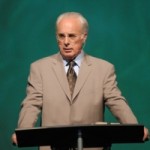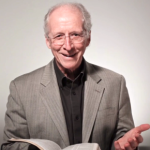 Transcript excerpt from spoken at the Truth Matters Conference, 2011:
Transcript excerpt from spoken at the Truth Matters Conference, 2011:
Some people say, “You know, we have to kind of change the message cause we’re not getting results. We’ve got to deal with this message because it’s not very effective.” Really? Well the next point I want to give you is this. If you really understand the glory of the gospel, you know the results depend on God. Okay? The results depend on God.
Remember the parable of the sower? What does it say about the sower? Nothing, absolutely nothing, it doesn’t say whether he uses his left hand, right hand, throw high, low, curve ball. It didn’t say anything about the sower.
What does it say about the bag he carried the seed in? Nothing, didn’t say anything about that.
What does it say about the method he used to throw it? Nothing, absolutely nothing. It’s a parable about soil, it doesn’t even say anything about the seed other than the seed is the truth, the gospel. It’s not about your technique in throwing the seed, it’s about the state of the soil. I don’t do soil work. That’s Holy Spirit work.
I love that passage in Mark, the parable where Jesus says the farmer sows the seed and goes to sleep because he has no idea how it grows. That’s right. You say, “We not getting the results.” Really, you think you’re in charge of results? I hear there’s some discussions, “We have to overcome consumer resistance.” Lots of luck. Consumer resistance is called depravity. Consumer resistance means the sinner is unable and unwilling, left to himself.
Look at (2 Cor 4) verse 3, this is so… this is so reasonable, this whole presentation of Paul makes so much sense, it just flows the way you think. Some of you are already saying, “Well, it gets discouraging. Paul, look, you’re going from town-to-town-to town, the churches are small, the churches are full of trouble. The town rejects you. The leaders reject you. The populace rejects you. They want to kill you. The Jews are after you. You’re really not having much success.
Here’s his answer. “Our gospel is veiled, it is veiled to those that are perishing.” That’s a category of people. That’s the default position of the entire human race. I’m not the problem.
Well how did they get like that? Verse 4, “The god of this world has blinded the minds of the unbelieving so that they might not see the light of the gospel of the glory of Christ who is the image of God.”
The problem is not your technique, the problem is the heart. You have all these people coming up with pragmatical ways to do effective evangelism. Really? It’s overcome consumer resistance to make the message more palatable. We’ll say more about that in some of the other portions of Scripture. You put yourself in the position of…I wrote a book Slave, some of you seen the book Slave? Imagine trying to sell that message in a world full of slaves. By the way, a crucified Jew in Jerusalem who was rejected by His people, rejected by His leaders, who was executed as a common criminal by the Romans rose from the dead, He’s the true and living God, the only Savior and He wants you to be His slave. Oh really? And by the way, you have to reject all other masters, confess your sin, repent and turn to Him as the only source of salvation.
Who is this again? A crucified Jew? This is what Paul is preaching in the Gentile world. And you need not only to put your faith in Him, but you need to confess Him as Lord and you’re His slave.
That’s a hard sell. You can’t overcome consumer’s resistance in a pagan/Gentile world when you’re talking about a crucified Jew to Gentiles who have no Old Testament background, who have no understanding of the sacrificial system, and you’re asking them to believe that this crucified Jew is God incarnate, the only Savior, the only true and living God, the only hope of salvation and you’re supposed to become His slave. That won’t fly, humanly speaking. That’s why it says in 1 Corinthians 1, as we will see later, preaching the cross was…what?…foolishness.
The results depend on God. That’s been the joy of ministry. I’m in charge of sowing, I’m not in charge of growing. I can’t give life. God alone gives life. And I love this, watch this, verse 5, “We do not preach ourselves.” Some method that we’ve concocted, some personal stories about us. “But Christ Jesus as Lord,” and we’re calling everybody to become slaves for Jesus’ sake.
You say, “Well how in the world do you expect to have any results at all with a message like that?”
Here’s the answer, verse 6, “Oh, for God who said light shall shine out of darkness who is the one who has shone in our hearts to give the light of the knowledge of the glory of God in the face of Christ.”
Is that not the most profound verse? You know what he’s saying? He’s saying creation, God said, “Let there be light.” And He spoke it into existence. That’s the model for salvation. God steps into the darkness of the sinner’s heart and turns on the light of the knowledge of the glory of God in the face of Christ.
This is what makes ministry so thrilling. If you get all wrapped up in results, you’re going to wind up preaching yourself and your technique and your style. You’re going to get caught up in your wardrobe and your shtick and your music and your cultural adaptations.
Well, if you understand the glory of the gospel, you also understand your personal insignificance. So what have we been saying? If you understand the glory of the gospel? Just review; you understand the superiority of the New Covenant, the mercy of ministry, the necessity of a pure heart, the fact that the Scripture is to be preached accurately, that spiritual results depends solely on God. And that you are personally insignificant… insignificant.






